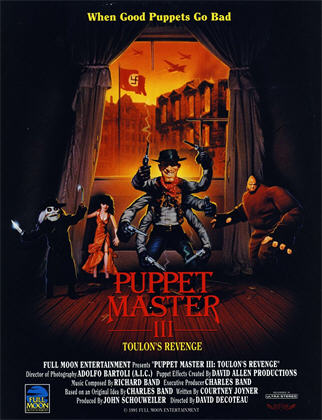
“Herr Toulon has developed a method of animating his puppets without strings. He said they were motorised, but it’s much more than that. I’ve seen them walk; react to sound as if they could hear. It’s as if they were alive…”
Director: David DeCoteau
Starring: Guy Rolfe, Richard Lynch, Ian Abercrombie, Walter Gotell, Aron Eisenberg, Sarah Douglas, Kristopher Logan, Matthew Faison
Screenplay: C. Courtney Joyner
Synopsis: Berlin, 1941. Major Kraus (Richard Lynch) of the Gestapo calls upon Dr Hess (Ian Abercrombie) to determine the progress of his research: Hess is trying to reanimate dead soldiers, so that they can be used to shield the living, but so far his subjects “live” only a few minutes, and are in agony before they die again. As Kraus warns Hess of what the penalty for failure will be, the scientist’s latest test subject suddenly attacks both of them, and can only be stopped by Kraus emptying his pistol into it… Puppet master Andre Toulon (Guy Rolfe) performs for a delighted crowd of children and their parents, including Peter Hertz (Aron Eisenberg) and his father (Matthew Faison). Also in the audience is Lieutenant Eric Stein (Kristopher Logan), who is interested both in Toulon’s politics, and the fact that one of his puppets, a six-armed cowboy named Six-Shooter, seems to perform without strings. Afterwards, introducing himself only as a fellow puppeteer, Stein goes backstage. As Toulon’s wife, Elsa (Sarah Douglas), silently puts the puppets away, Stein questions Toulon about his methods and is told that the “stringless” puppets are motorised. Stein leaves, but only goes so far as the alley behind the theatre; he climbs up to a window, and through it sees – and photographs – an astonishing sight: puppets that move on their own, and the Toulons “feeding” them with a strange green substance… Stein reports Toulon to Major Kraus, accusing him of mocking the Reich through his puppet show. Dr Hess, however, is far more interested in Stein’s photographs, and insists on speaking to Toulon before the Gestapo does. When Kraus rejects his demand, Hess phones General Müller (Walter Gotell), who orders Kraus to give Hess what he wants. However, the confrontation with the Toulons ends disastrously when, trying to prevent Hess from taking her husband’s formula, Elsa intervenes and is shot down. Toulon is dragged away from her and placed in one of the cars outside; two of his puppets are thrown in after him. Elsa spits defiantly at Kraus, who responds by shooting her dead… On the way to Gestapo Headquarters, Pinhead and Tunneler dispose of Toulon’s guard and driver, causing the car to crash. Toulon gathers up his puppets and escapes into the night… Kraus and Hess give their versions of events to General Müller, who reproves Kraus for killing Elsa when they could have used her to compel Toulon’s cooperation. A phone-call then reports that Toulon has escaped from Gestapo custody. Furious and humiliated, Kraus sends his men out to search the city; while Hess takes Toulon’s formula to his laboratory, to analyse it. Evading the searchers, Toulon returns to the workshop behind his theatre, where Jester and Six-Shooter have been hiding. He swears to take revenge on those responsible for Elsa’s death, and that he will have no mercy. His first stop is the morgue, where Elsa’s body has been taken. The puppets break in, and Pinhead strangles the attendant to death while Jester unlocks the door to admit Toulon. Toulon extracts from Elsa’s body her life-essence, which he uses infuses into a puppet that he earlier created in her image—bringing her back to life as Leech Woman…
Comments: I found Puppet Master III: Toulon’s Revenge a rather frustrating experience. On its own merits, it’s better than either of its predecessors; better structured, with far less padding; but at the same time, it not only contradicts the earlier films, it doesn’t even make narrative sense on its own terms. If you have the sort of brain that allows you to block out the constant distraction of being told the opposite of what you were told before, you’ll probably have a lot of fun with it. For the more obsessive amongst us, however, the film functions as a mild form of torture.
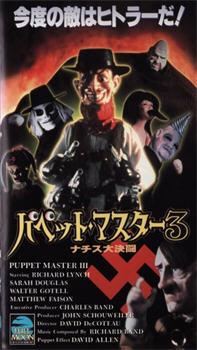
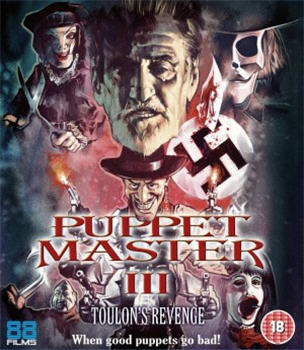
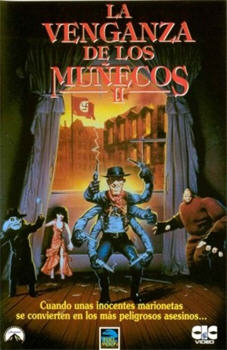
And what’s really frustrating is that most of this wasn’t necessary. Puppet Master III is set in Berlin in 1941, where we find Toulon hale and hearty, which belies both the already contradictory Puppet Master and Puppet Master II, which have him shooting himself in California in 1939 and rising from a grave marked 1941, respectively.
As this story unfolds, however, it is staggeringly clear that almost everything that is wrong with this film could have been avoided simply by placing the action in the 1930s, in the early, or at least earlier, days of the Third Reich. Not only would this have allowed continuity to be maintained (Toulon falls foul of the Nazis as they rise to power and flees to California, where he later shoots himself), but it would give at least some credibility to the concept of a satirical puppet show getting away with mocking Hitler, while the audience laughs. In the era of Cabaret, perhaps; in 1941!? I don’t think so.
The other unnecessary point here is Elsa Mark II, who bears not the slightest resemblance, in age, looks or character, to the Frau Toulon of Puppet Master II. This, too, is easily addressed: the character should have been Toulon’s devoted only child, not his wife. Everything else could have played out as written; his revenge would have been every bit as emotionally motivated.
You’ll gather from all this that I spent most of my watching of Puppet Master III rewriting the film in my head, which is true; but you shouldn’t conclude from this that I didn’t enjoy it.
Most fundamentally, the realisation of the puppets here, still the work of David Allen and his people, is truly excellent; in fact, this is one of the very rare franchises where the effects get better rather than worse over time. In addition, the puppets have more to do, as they become the agents of Toulon’s revenge—and it is particularly pleasing that Jester gets to be as active as the rest, with each puppet’s individual skills being called upon at various times.
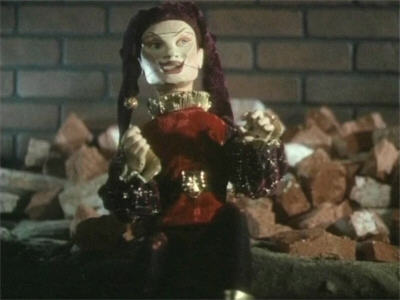
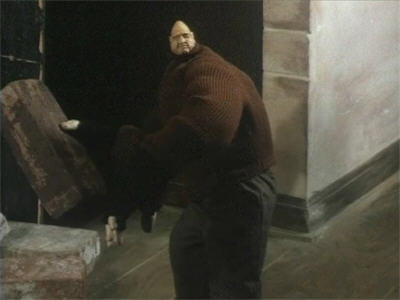
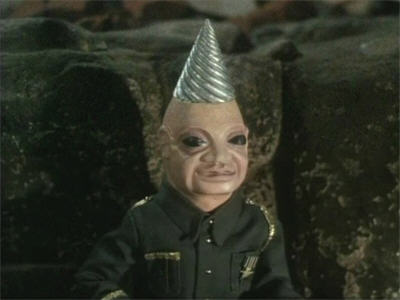
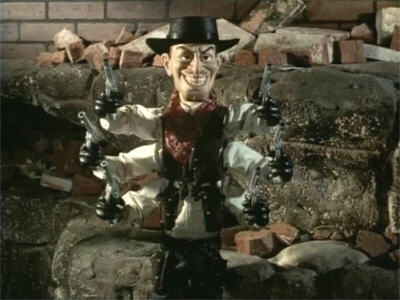
Though his interpretation of the character is, inevitably, quite different from that of either William Hickey or Steve Welles, Guy Rolfe’s performance as Toulon is another of the film’s strengths, giving the puppeteer real dignity and lending gravitas to his eventual program of revenge. Equally important, however, is the way that Rolfe’s best-known genre film, Mr Sardonicus, is evoked in the design of the new puppet, Six-Shooter, whose carved-in grin is one of his defining characteristics, along with his six arms.
Six-Shooter is an appealing new addition just as is; though of course for some of us the root of his charm lies in his laugh—which is unmistakeably based upon that of Dwight Fry’s Renfield, in Dracula.
(My one objection to him is, inevitably, chronological: this positions him as one of the original puppets, so why isn’t he in the other two films? Although come to think of it, I’m pretty sure his head is on display in Toulon’s attic-workshop in Puppet Master II.)
Puppet Master III also boasts a more impressive human villain in Major Kraus, played by Richard Lynch; once, at least, we get past a senior officer of the Gestapo choosing to dress like a private investigator in an American movie of the 40s, right down to the fedora and black trench-coat and the cigarette constantly dangling from his lower lip. However, as it turns out, there’s a reason for all this…
The other aspect of the film that appeals to me is that SCIENCE!! plays a more prominent role in the story this time. Of course there are always science-fiction elements in the Puppet Master films, but this time we open with the bizarre experiments of Dr Hess, who is trying to find a way to reanimate dead German soldiers, so that they way be used to provide a shield for live German soldiers.
(Which is, of course, almost exactly the way that the events of Revolt Of The Zombies are set in motion…)
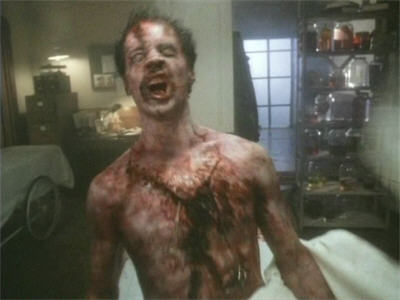
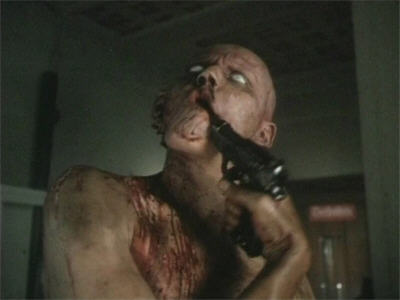
Major Kraus has come to warn Hess about the likely consequences of his lack of progress, but the antagonists are interrupted when Hess’s bloody, thrashing experimental subject launches himself off the operating table and attacks first Kraus and then Hess, trashing the operating-theatre in the process. Kraus empties his pistol into the undead soldier (which we are left to assume “killed him”), just as his driver, Lieutenant Stein, runs into the room to gawp at the mayhem.
Stein, who we have already been shown is a puppeteer himself (his skeleton-puppet is actually adorable; I’m sure it’s meant to indicate his eee-vil Nazi mentality, but when you consider what good-guy Toulon has come up with…), is next seen in the audience of Toulon’s puppet-show, taking photographs as children and adults alike laugh delightedly at the sight of a quivering Adolf Hitler (with strings) being terrorised by a stringless six-armed cowboy puppet that speaks with a drawling American accent, courtesy of Toulon.
After the show, the children gather around Toulon backstage, including his biggest fan, Peter Hertz (Aron Eisenberg as the world’s least convincing ghetto urchin, too old for the role he’s playing). As they leave, Stein enters, praising the puppets but warning Toulon about the content of the show.
“Political satire is one of the marks of a healthy society,” replies Toulon, expressing what I’m sure was a commonly held opinion in 1941 Berlin, and adds that he has no intention of changing anything.
When Stein has gone, a frightened Elsa warns Toulon that he could be a dangerous enemy. Toulon insists however, that the two of them will be just fine: “As long as we don’t show fear.”
Ah-hmm?
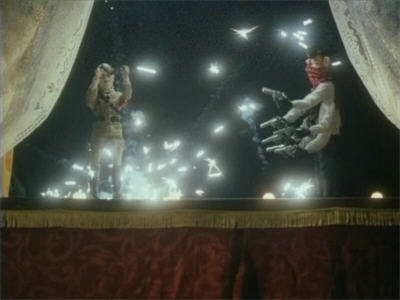
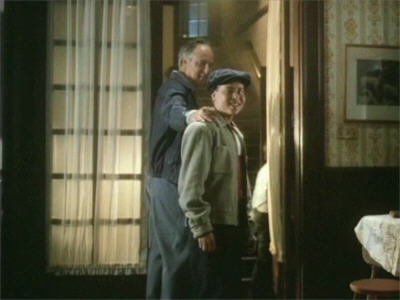
Meanwhile— Call me crazy, but I think if I were either someone capable of bringing inanimate objects to life, or someone holding anti-Nazi sentiments in 1941 Berlin, let alone both, I’d make sure I wasn’t living in a building with the world’s thinnest walls; or at least I’d keep the windows closed and covered. It isn’t clear which of these situations is responsible, but either way the voices of the Toulons are perfectly audible in the alley behind the theatre, while when Stein climbs up to one of the windows, he is able to see and take photographs through it as Toulon gives his puppets their “dinner”.
In this, too, Puppet Master III contradicts II, wherein a dose of the formula could keep the puppets animate for fifty years before wearing off. Here we watch as Toulon gives each of them what is implied to be a regular small dose by injecting it at the base of their throats.
Later, admitting his inability to paint her portrait as he has always wanted to do, Toulon offers Elsa an alternative gift: a puppet (inanimate) carved in her image. A rather embarrassing (to the viewer) conversation about their marriage follows, with Elsa assuring Toulon that, “Experienced men are very sexy!” Toulon expresses his great love for her, telling her that he could not live without her, which of course prompts Elsa to promise him that, “I’m never going to leave you!”
Sigh.
Stein reports his discoveries to Kraus, who makes immediately plans to shut down the puppet-show and arrest Toulon. Hess, however, is greatly excited by the implications of Stein’s photographs, and insists that he must speak to Toulon first, and before the Gestapo have had their way with him. Hess finally takes the step of telephoning General Müller who, in a series of sub-sub-sub-Salon Kitty scenes, will be shown as spending all of his spare time at the local brothel.
(The film offers some boobs here, but to get to them you have to deal with an almost-naked Walter Gotell.)
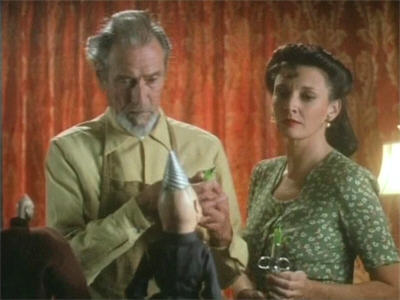
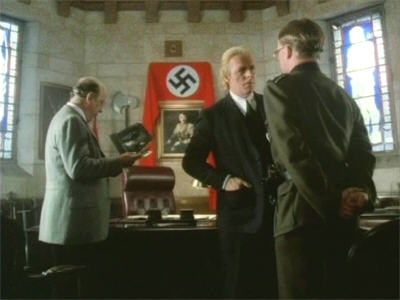
Müller sides with Hess, but in spite of this (not altogether surprisingly) the raid on Toulon’s theatre under Kraus’s command goes disastrously wrong. When Hess picks up a vial of Toulon’s formula, Elsa tries to snatch it back from him and gets shot in the back for her pains. Toulon himself is dragged roughly away, and Pinhead and Tunneler are taken along as examples of his work, while Hess, shocked and guilt-ridden over how the confrontation has played out, nevertheless secures samples of the formula. Meanwhile, Kraus himself finishes off Elsa.
Kraus and Hess occupy one car, with Stein driving, while a grieving Toulon is escorted by two soldiers. On the way to Gestapo HQ, the soldier in the back seat with Toulon takes Pinhead away from him, examining the puppet curiously. Pinhead immediately comes to life and grabs the soldier by the throat, while Tunneler drills through the seat and also through the body of the driver. The car carrying Toulon spins out of control and crashes. Shaken but not hurt, Toulon grabs the puppets and slips away into the foggy night…
(And for all of his gruesome activities, this is the first time we ever see Tunneler with any blood on him! Don’t celebrate too much, though: in the next scene he’s squeaky-clean again.)
General Müller is listening to yet another squabble between Kraus and Hess when he receives a report of Toulon’s escape, which sends Kraus away in an embarrassed fury.
(Kraus here suggests that Elsa was Jewish. If so, her husband’s behaviour in drawing the Nazis’ attention was even more stupidly dangerous than it appeared at first glance.)
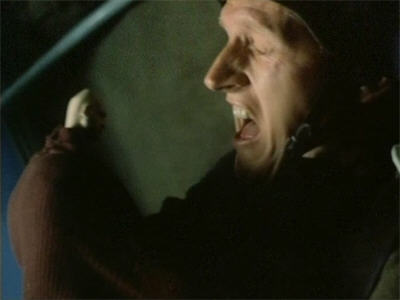
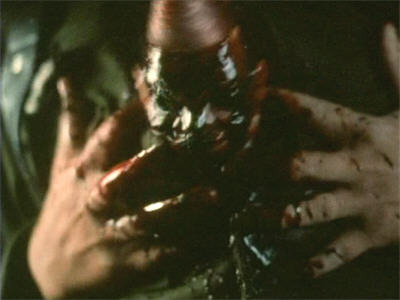
At this point, an exceedingly tiresome movie convention makes itself felt: for the most part, though presumably everyone in this film is speaking German, the actors all speak German-accented English, which is annoying enough; but all the minor characters speak German only; while Kraus spends much of his time snarling, “Macht schnell!” at his underlings.
Kraus’s first stop is the theatre, where a search reveals nothing. (Kraus does find Toulon’s discarded Hitler-puppet, though; he…isn’t impressed.) He orders his men to burn the place, and the puppet-booth is splashed with petrol and set alight—but when Toulon himself shows up, the rest of the building (including his workshop) is unharmed. Did the puppets put the fire out, then?
Anyway, Toulon does soon show up, and finds Jester and Six-Shooter waiting for him. He and the puppets grieve together for Elsa.
One place where Puppet Master III’s budget really hurts it is in its depiction of Berlin, where we find nothing but empty streets and deserted buildings; cost-effective, but not exactly convincing (or accurate). Thus, Toulon’s next stopping-place is a deserted pharmacy, the windows boarded-up, and the interiors a wreck. Whether it was just a good hiding-place or whether Toulon went there deliberately isn’t clear, but he doesn’t leave empty-handed. Rather, he takes with him a jar of leeches, which he apostrophises with, “You suck our life’s blood away!”
Okay. I have no idea where this is coming from, but I think we can all see where it’s going…
Toulon here takes a moment to proclaim his scheme of vengeance, telling the puppets that, like himself, they must have no mercy.
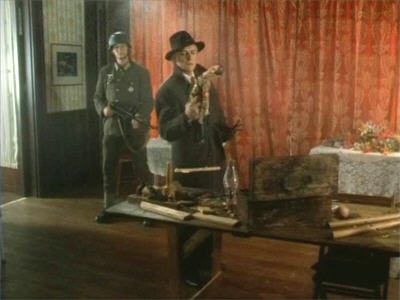
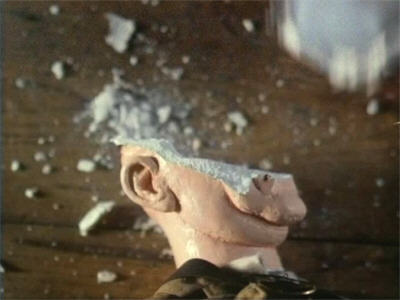
Toulon’s next stop is the morgue. Pinhead takes care of the attendant, and Toulon approaches Elsa’s body—doing something with a scalpel that we are not permitted to see; although it seems unlikely that it is the crude brain-surgery of Puppet Master II. As he finishes up, Toulon is caught by the doctor in charge, but Jester incapacitates him with a scalpel, allowing the intruders to make their escape.
The next thing we know, Toulon is injecting a newly-prepared batch of green goo into the Elsa-puppet, which writhes and jerks as it comes to life. Toulon then feeds a big fat leech into her mouth, completing her transformation into—Leech Woman!
(Which makes nonsense of undead Toulon’s shrugging dismissal of Leech Woman’s death in the previous film, but, oh well…)
We then see Stein dropping off Kraus at Gestapo HQ, and being ordered to service the car. He mutters discontentedly to himself as he obeys his orders, but he should have been grateful for small mercies. As he drops the bonnet he is confronted by Jester and Pinhead. The latter incapacitates him with a heavy wrench, but allows Leech Woman to finish the job, and—whoa!
Let’s just say she’s a LOT more efficient here than we’re used to.
“Good-night, fellow-puppeteer!” mocks Toulon from the shadows, as Stein screams…
Back in Hess’s operating-theatre, we discover that he has succeeded in animating another soldier, but this one just wants to shoot himself—which is how his life ended. Hess argues that if he was to reanimate soldiers who were killed in action, who were devoted to their cause, they would have what they want: an undead shield for their armed forces. Hess again insists to Kraus that he must be allowed to speak to Toulon.
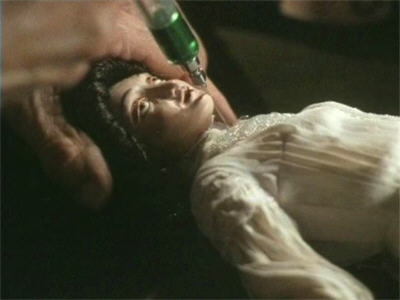
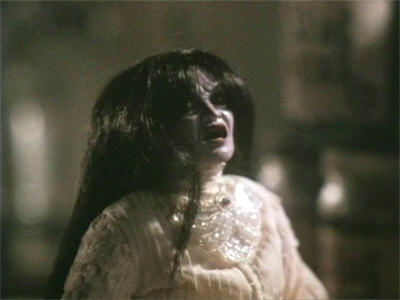
Outside, Kraus’s car pulls up, but without Stein at the wheel. The driver breaks his predecessor’s fate to Kraus and drives him to the alley where Stein’s body was found—the face covered in leeches…
The search that Kraus instigated earlier then hits upon the deserted pharmacy, where a soldier finds a test tube of the green goo—rather careless, Toulon, wasn’t it? Angrily expanding the search still further, Kraus glares at the leech-jars sitting on the shelves before going literally ballistic.
By this time Toulon has disguised himself as a blind man, and now uses a cane to tap his way to General Müller’s favourite brothel, where a great deal of fraternisation appears to be going on. Toulon slips around the corner of the building, taking cover in an alcove after releasing Six-Shooter—who promptly scuttles up the side of the building like a gigantic bug.
You know, between this and the Renfieldian laugh, there really isn’t too much more this guy could do to endear himself to me.
Upstairs, the General has just finished a session with one of the prostitutes (yeah, thanks for sharing that with us; it’s Michelle Bauer, by the way, if that floats your boat) and sent her away when he finds himself confronted by what he concludes is “a joke”. He is soon disabused. Six-Shooter’s first shot misses, and the General’s return of fire blows off one of his adversary’s arms. He has five more, though, and five more guns, and soon a thoroughly plugged general is sent plunging through the window, to crash to ground below, as shocked soldiers and prostitutes gather around and, in the background, a blind man taps away…
(For those of you who like that kind of thing, the substitution of a stuntman here is not exactly seamless; not to mention the very carefully judged “fall” from the window…)
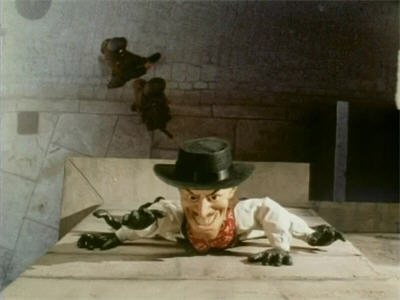
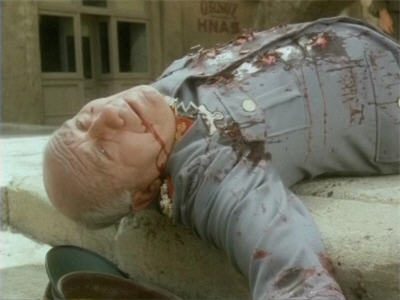
Toulon’s latest refuge is a bombed-out building on the outskirts of the city (which is much emptier, and much more damaged, in this film than was actually the case in 1941, when the effects of bombing raids by the British and the Soviets were still more psychological than physical), which also becomes the hiding-place of Peter Hertz and his father, after Frau Hertz, who is Polish, is arrested as a spy. They agree to keep each other’s secrets, Hertz’s being that he is seeking a way of getting Peter out of the country.
Kraus and Hess examine the room in which General Müller was shot, trying to make sense of the evidence—including why, if the assassin missed his first shot, he isn’t dead. It is Hess who finds Six-Shooter’s arm, and briefly tries to conceal it; but Kraus wrenches it away from him. He then places Hess under permanent guard.
Peter, who has appointed himself Toulon’s “assistant”, offers to do a run to his workshop and collect the parts needed to fix Six-Shooter, but Toulon forbids this. Peter then observes that the new puppet that Toulon is working on looks a lot like the man who came and took his mother away… The two of them have a narrow escape when the worst searchers in the entire German army give their hideout the once-over, but somehow fail to see the elderly man and the boy sitting in plain sight. Peter then goes up to bed (waving companionably at Pinhead on his way out, and getting a wave back), and tells his father that Herr Toulon saved him from the soldiers. Hertz is in no mood for hearing good things about Toulon, however, and roughly orders Peter to stay away from him, much to the boy’s dismay. Hertz has found out about the reward being offered for the capture of Andre Toulon…
In fact, both Hertzes are about to do their best to get Toulon and themselves killed (and, in one case, succeed). Hertz does give Toulon away to Kraus, demanding in exchange not the money, but the release of his wife—because, you know, Nazis always keep their promises—while Peter disobeys Toulon and goes to his workshop, where he is caught by Hess.
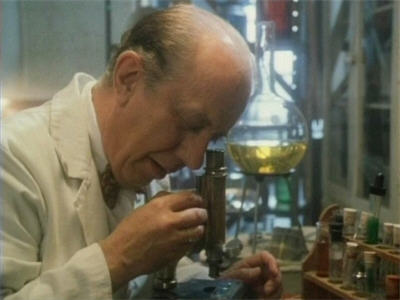
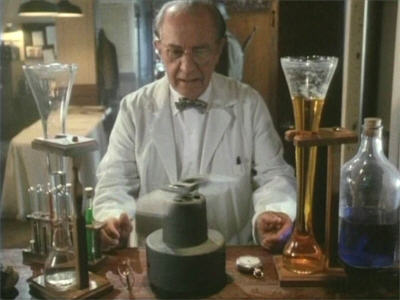
Hess, however, manages to convince him that he only wants to talk to Toulon, and in the end Peter leads him (and his soldier-guard! – who for most of his duty has an expression on his face which suggests that he’d rather be on the eastern front than guarding a smart-mouth scientist) to the hideout—minutes before his father leads Kraus and his goons there.
Prior to this, however, Hess reveals his knowledge of Toulon’s background as a doctor, a teacher of anatomy and chemistry, and tries to win from him the secret of the puppets. Toulon confesses that he learned the secret during a trip to Cairo—
(“Fifteen years ago”, even though this film, never mind the previous one, dates his trip as taking place in 1912. The background given here for Toulon of course negates his established back-story as “Europe’s greatest puppet master”.)
—and, in response to Hess’s frustrated protest that something must be missing from his sample of the serum, which he cannot get to work, reveals that the secret is the “life-essence”, the will to live, of the individual human beings he has recreated in his puppets, and whose personas reflect their real-life counterparts. Unlike Hess’s experimental subjects, the people who “became” Toulon’s puppets wanted this form of life-after-death.
So basically it’s Jan-In-The-Pan in reverse.
And while I suppose you could argue that Toulon’s efforts to transfer himself and Elsa into the life-size mannequins towards the end of Puppet Master II are in accordance with what we’re told here, really, that film’s enthusiastic (and distinctly non-voluntary) brain-harvesting is hardly in the spirit of the voluntary “spirit transference” we’re offered here as an explanation for the puppets; nor with the very discreet recovery of whatever was taken from Elsa’s body.
(Are we really supposed to believe that Toulon got informed consent for all this!? “So, darling, if the Nazis kill you, is it okay if I turn you into a psychotic, leech-hocking puppet?” “Darling! I’d be honoured!”)
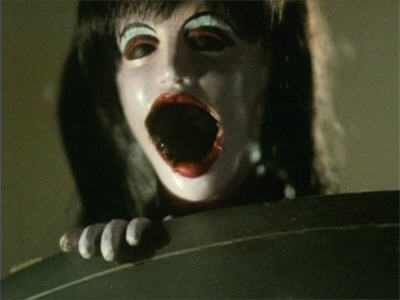
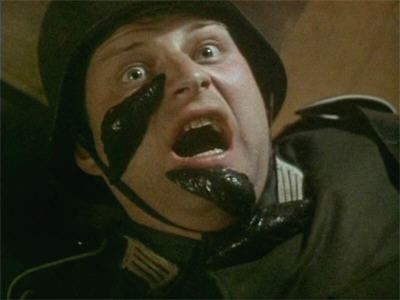
Toulon then shows Hess the new puppet he is working on—which has a face like a skull, and comes complete with a fedora and a trench-coat. “An excellent likeness,” comments Hess drily.
By this time the others have arrived, and Kraus gives Hertz a chance to get Peter out of the building. His state of agitation reveals to the others what’s happening, although Toulon simply tells Peter to do as his father says. Then Kraus sends the soldiers in to get Toulon; although fortunately he sends them in one by one (rather like how the bad guys in martial arts films always attack one at a time); so that the puppets are able to take them down, one by one. And while you might not think we’d have time for leech-hocking in such a desperate situation—well, I did tell you she’s a lot more efficient here…
Kraus is rather slow to react to the sounds of screaming and gunfire, and Toulon and Hess make it out the backdoor before he goes in himself. What he finds causes Kraus to conclude that Hertz has led him into a trap. Realising that he has no other way out, Hertz takes a bullet protecting Peter, who manages to escape. Meanwhile, Hess stupidly stops in his flight to check on his duty-soldier, who was gunned down by Six-Shooter, and gets a knife in the guts for his trouble. He dies urging Toulon to go on with the fight…
Dressed in a stolen soldier’s uniform, Toulon makes it back to his theatre, where he collapses on one of the audience’s benches, exhausted. His sleep is troubled by memories of his trip to Cairo, and the stranger who passed on the secret of the puppets to him…
Which only introduces yet another difficulty (even aside from the 1912 thing): namely, that it is clear in Puppet Master II that Blade’s prototype was Toulon’s stringless Mephistopheles, the last of his “traditional” puppets; yet here we have both Peter and Hess recognising Major Kraus in the new puppet that Toulon is preparing—hence the Gestapo officer’s unconventional wardrobe. Showing Mephistopheles to us in flashback hardly helps to sell the retcon.
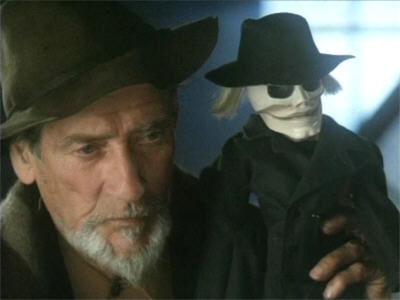
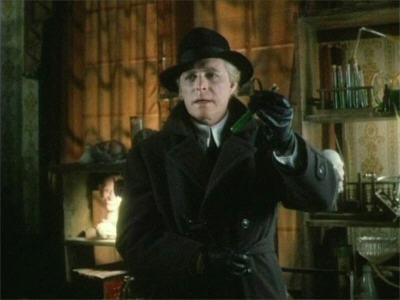
(But on the other hand Toulon’s flashback gives us another glimpse of Djinn the Homunculus—yayyy!!)
But after all this jerking around, we do get a nice moment, when Leech Woman – Elsa – wakes Toulon by gently stroking his hair. He sits up to find that Peter has tracked him down, fifteen-year-old boys being so much more efficient than the Gestapo. Peter offers soberly to help Toulon in whatever he has planned.
And there is now only one part of Toulon’s plan of revenge that remains to be carried out, and its execution is greatly facilitated by the astonishing underpopulation of Gestapo Headquarters.
(I guess when Kraus sent “everyone” out to search for Toulon, he really meant it! The building is as deserted as a Haddonfield hospital…)
Kraus walks alone through the otherwise empty building, his footsteps echoing off the walls as he makes his lonely way upstairs to his unguarded office…
…where, to be fair, he does find company waiting.
Kraus’s first discovery is that the phone isn’t working. He looks up to find Jester sitting nearby, taunting him with a small pair of scissors; but as he rushes to wreak vengeance on his small tormentor, he is literally brought down, first by a slash across the shin, then by a slash across his hand, delivered by – who else? – Blade.
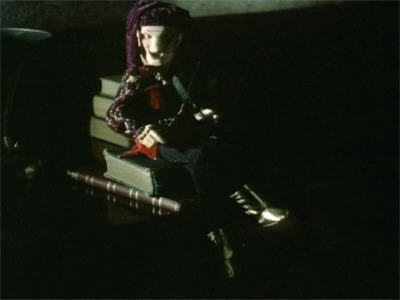
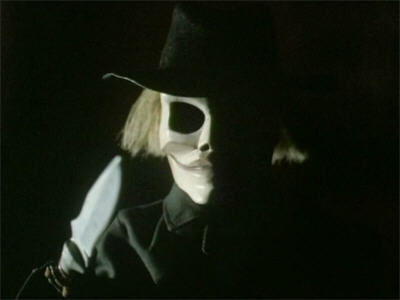
Toulon then emerges from the shadows. Kraus is at first scornful of the threat posed by the puppets, and even manages to graze Toulon with a shot; but Pinhead puts him down again with a marble ashtray to the head, while Toulon starts rigging a series of grappling ropes, hanging them over the light-fittings.
Pinhead sets to work again, driving the hooks into various points of Kraus’s body; so that when he is done, and Toulon starts hauling on the main rope, Kraus is jerked up into the air, dangling there, just like—oh, I don’t know…
While Toulon secures the rope to a flag-pole, Pinhead drives a halberd into the wooden floor beneath Kraus, pointy bits up. And then Toulon, smiling in the face of Kraus’s pain and terror, sets fire to the flag—the flames soon spreading to the rope…
And of course, there’s nobody around to see as the elderly man in the ill-fitting uniform carrying a large bundle slips away from Gestapo Headquarters. He is next seen at the railways station, identifying himself as Major Kraus, and receiving permission for himself and his companion to depart. To a casual platform acquaintance he explains that he and the boy are leaving for Switzerland—and then perhaps America…
A bit late for continuity now, isn’t it!?
And in that respect I am not, as I’ve said, the right audience for Puppet Master III, which seems determined to jerk me out of engagement with it at every opportunity by contradicting everything about the first two films that could be contradicted.
Moreover, I must admit to some confusion over the subplot dealing with the introduction of Blade. From the set-up I assumed that Toulon intended to “capture” Kraus, inflicting an ongoing punishment upon him by turning him into a puppet; but Blade is up and around and participating when Toulon dishes out his final, gruesome act of revenge. So if not Kraus’s, whose “essence” did Toulon use to bring that about?—and if he didn’t intend puppetising him, why did he make Blade look like Kraus (or vice-versa) in the first place?
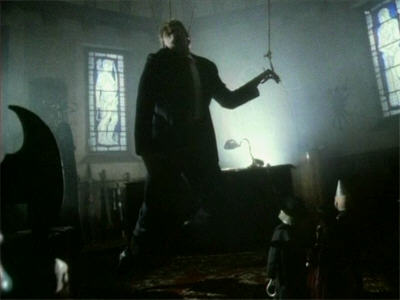
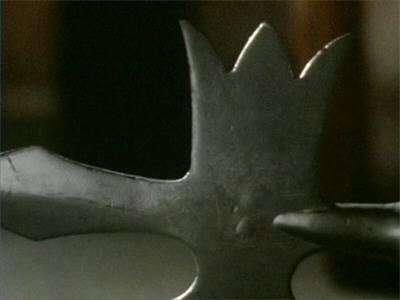
(Toulon didn’t stop to “drain” Hess, did he? There’s no indication of it—and given that it would require Toulon to take action in the middle of the street, in broad daylight, while fleeing the Gestapo, it doesn’t seem likely—but I could certainly picture the scientist slashing at Kraus with great enthusiasm, as does Blade.)
But while I have my problems with it, I can imagine this film working well for a neophyte, as an introduction to the franchise. After all, despite its shortcomings it does get right the most important thing: the puppet-work is very skilful, the puppets have plenty to do overall, and each of them is given a good share of the action. Add to this a mad-science subplot, a ranting Richard Lynch, and by far the most interesting Andre Toulon we’ve had so far, and you’ve got a fun little standalone film—whatever its sins as a franchise entry.
**************************************************************************

This review is part of the B-Masters’ HELLO, DOLLY Roundtable.

Yay, new PM review from Lyz, for my favorite of the series, to boot! It shocked me later in life, when I learned my favorite entry in the series was a David DeCoteau film…
Maybe it was due to my youthful attempts to put the Showa Godzilla films into a logical timeline, but I never found myself too bothered by all the changes this movie made to the previous ones, even though I noticed them. I guess I was too entertained by Rolfe, Lynch, and the puppets to much care, which is out of character for me, but anyway. I did balk at Leech Woman being his wife due to the aforementioned nonchalance Toulon shows when she’s destroyed in the second movie, and the Blade design thing, particularly since Kraus doesn’t even end up being used to animate that puppet. (Probably just as well; if he did want to come back, it’d be solely to murder Toulon.) I think it was Hess that animated Blade, though I’m not sure whether there was an oblique mention of it, or if I just decided this due to no other candidate being present. I do like your suggested rewrites at the beginning; you’ve got a knack for that, as seen with the Paranormal Activity review (and ISKWYDLS long before that).
I’d ask the traditional “Which is your favorite puppet?” question here, but it seems fairly obvious the answer would be “Six-Shooter.” Seeing as you were happy Jester got more and more things to do, I would guess that’d be your runner-up. For me, it’s a deadlock between Six-Shooter and Blade. I know most people go with Blade, but they gave one of the best designs AND the best personality to it, so it’s easy to see why.
And, as usual, a bang-up job on the review, even if I did miss the little snarky comments below the pictures.
LikeLike
OH DAMN IT ALL TO HELL AND BACK
Is this again a job for you, or am I able to edit that myself?
(I swear I’m not doing this on purpose…)
LikeLike
I’m sorely tempted to leave it like that, as a lesson to you! 😀
****
I know! And it’s my first David DeCoteau film, too (review-wise, I mean).
Yeah, like I said, I just don’t have the right kind of brain for this—I’m just not capable of letting stuff go. And of course, watching them back-to-back didn’t help. (Mind you, given that II and III were both released in 1991, it’s not like anyone was given time to forget!) But that doesn’t mean it won’t, or shouldn’t, work for other people.
For favourite puppets, I could nearly say “Leech Woman”, just for the magnitudes of improvement; and Jester for the same thing. (One of my favourite moments is when Jester skitters across the floor wielding a scalpel!) Blade always has an unfair advantage, he’s just too cool for school (even if he’s not based on Richard Lynch).
As for Six-Shooter, I’m almost tempted to accuse him of courting my favour a little too blatantly! 🙂
The absence of captioning is praise, in its own way.
LikeLike
Not that I wouldn’t deserve it, but I do thank you for your mercy, my dear.
Ah, yes, I’d forgotten your m.o. regarding when captions are used. Fair enough.
I mentioned it being out of character for me because usually I’m right there with you as far as stories/rules/plot threads being needlessly changed that way. I took particular exception to Final Destination 2, of all things, for that very reason; and indeed it angered me enough that I have yet to watch any further installments despite that kind of over-the-top death-dealing being right up my alley. Something about this movie just puts that part of me to sleep, apparently.
After Six-Shooter and Blade, it’s hard for me to pick favorites; they all kind of run even for me. I do really like Torch, but that’s almost entirely because of his design, and the fact that he roasts that little bastard. Jester’s personality, Tunneler’s spookiness, Leech Woman’s ridiculous weapon of choice (and accompanying gagging noises), the fact that Pinhead = people wrestling with a puppet…so hard to choose.
I also look forward to your inevitable squealing over the Totems whenever you get around to the next two movies.
LikeLike
I guess the point is that my captioning isn’t dictated by whether a film is “good” or “bad”, it’s by whether while watching it I find myself talking back to it. It’s content, not quality. So some good films get captioned and some bad ones don’t. PM II gives me stupid and insulting science and an annoying Mummy riff, and there you go.
I like Torch for the same reason, of course, but given Toulon’s emerging back-story his design becomes ever more questionable. Pinhead, yeah… I included a screenshot of my favourite moment here, when he lobs a brick at one of the soldiers. I’ve reached the point where I cheer when I see Cindy Lou Sorenson’s name in the credits. 🙂
If you say I’ll squeal, I guess I’ll squeal. You know me so well…
I haven’t seen any of the Final Destination films yet; not really my thing, though I imagine I’ll get around to them at some point. I’m told that one of them has the best car-crash ever filmed.
LikeLike
This has been a fascinating look at the inner workings of Lyz’s captions. I guess there’s still a little mystery in the relationship after all!
You have a good point re: Torch’s design, which indeed becomes questionable post-PM 3. Still pales in comparison to the Leech Woman thing, though, especially if we go with Blade’s design being based on Kraus…
I reacted to the Totems the way I react to any adorable animal in a movie. Further, I’m sure they’re supposed to be seen as hideous and terrifying, and I know your reaction to that sort of thing tends to be precisely the opposite. Looking forward to finding out, whenever that may be.
I watched the original FD because, while a lot of people told me it wasn’t very good, the deaths were like (as one person delightfully put it) “Rube Goldberg on acid.” Instead, I ended up legitimately enjoying it. While the deaths were indeed something, a big reason I liked it was the internal logic and the consistency with which the movie held to it. Which made the second one’s screwing with things even more unforgivable to me. While I have only seen the first two, I’m going to assume the car crash you mention is the disaster that kicks off the second one. It is, indeed, a jaw-dropping piece of film making. Although “car crash” is waaaaaaaaaaaaaaaaaaay too mild a description for the vehicular holocaust that unfolds.
LikeLike
“You’ll gather from all this that I spent most of my watching of Puppet Master III rewriting the film in my head, which is true; but you shouldn’t conclude from this that I didn’t enjoy it.”
As a sci-fi techi geek, I spend a lot of time doing this in my head when watching b movies too. It is part of what makes watching them fun, being yanked out of your suspension of belief with a ‘WTF?’ moment and fixing it on the fly to return yourself to that suspension.
LikeLike
When there is a fix. 🙂
LikeLike
Too bad about the in-universe inconsistencies of this entry in the series as it sounds like it’s much better constructed than the earlier films. Thanks for explaining why some films get captions and some don’t, I always kind of wondered why that happened.
LikeLike
It might be easier to just imagine that the third movie is a retcon and that the series went from there with the occasional odd one-off. I mean, they never really went back to being the villains after this one, with maybe one exception that is garbage anyway so who cares; this version of Toulon is who we get for the rest of the series; more changes to the original story line occur in Retro Puppet Master; and the three most recent movies have them fighting the Nazis some more. In fact, I can’t believe I’m just now coming up with this. Maybe this would help with future viewings, Lyz? Sort of a Showa/Heisei divide, with the exception that the second timeline doesn’t even acknowledge the first movie in the franchise? So, actually it’d be more Showa through Millennium, and then Shin Godzilla.
Anyway, Ray, you should watch this one either way. It may be easier going if you’ve not seen the first two, I suppose, although you may still want to catch them at some point, as they’ve definitely got their moments. Then maybe the next two; it’s been a while, but I recall them being cheesy fun. Plus the Totems are great.
And then go no further. Seriously.
It makes me sad to think that Lyz will likely feel compelled to review them some day…
LikeLike
I think I’m going to give the film a try. It sounds fun and as for the in-universe inconsistency issue, well I’ve been a fan of old Doctor Who since first seeing some Jon Pertwee episodes back when I was eight (1978! – it doesn’t seem so long ago somehow…) so I must have considerable flexibility in that regard. How many different ways did Atlantis get destroyed in that universe? Three? Four?
LikeLike
That’s all very well in retrospect, my dear, but it doesn’t help when you’re watching the films for the first time! 🙂
Oh, “some day”… I’ve got plenty of other franchises to wrap up first.
LikeLike
Alas, my darling! As I am not a Time Lord, I indeed can’t change your first time; but maybe it’ll help in the future, particularly when “some day” finally arrives?
You should hit the next two of these, and then “conveniently” get wrapped up in, say, the Godzilla series so that you’ll never have a chance to go back and ruin things by watching all the others. I am totally suggesting this out of pure altruism and not in any way because I dream about new Godzilla reviews from you, I assure you.
LikeLike
Well, that isn’t entirely out of the question, or at least a new kaiju review isn’t, but honesty compels me to admit that you’re likely to get another crappy Amityville sequel review first. 🙂
LikeLike
That doesn’t surprise me; you’ve just about capped that series, haven’t you? I’m sure you’re anxious to have one less franchise hanging over your head.
LikeLike
There’s two more to go plus one sitting in Unreleased Hell; why they don’t just stick it on a disc and have done with it I’m sure I don’t know.
It’s like a game of keep-away: every time I think I’m done they crank out just one more…
LikeLike
Interesting review–it actually makes me want to see the film (flaws and all).
When a franchise reaches a certain number–say, five or more–and I haven’t seen any of the films, I tend to think they’re all pretty sub-par. I don’t know why that is, I guess if I figure if the title is that exploitable, it must be all the film has going for it, and thus the first one may not have been all that much. Of the series I’ve seen, things tend to get sillier and dumber as the number rises. Even an expensive property like James Bond doesn’t seem to be immune to it.
I’ve only seen the first Puppet Master film, and honestly wasn’t impressed, so I guess that explains it. Nice to know there are entertaining entries.
LikeLike
Thank you! This is certainly the best of the three so far, on its own merits. But even when the films are crappy, the puppets are worth watching. 🙂
Franchises usually do become an exercise in diminishing returns, so I guess it’s how well the central premise works for you.
LikeLike
Somewhere I got the idea that the kid’s brain was in Pinhead? Also just wanted to say: long-time reader since before you changed sites, first-time commenter, and I’ve very much enjoyed all your work.
LikeLiked by 1 person